You bought a tent and want to head on your great outdoor adventure, but now you read that wild camping is illegal in many European countries. Does it mean you are doomed to stay on official campgrounds, surrounded by families with kids or groups of young party makers and paying 15 euros a night? Luckily, in many European countries, there are alternatives!
This post was last updated in April 2024
My comprehensive guide to wild camping in Europe will help you plan your holidays with the tent and enjoy the beautiful nature of the Old Continent.
I’ll also share some tips on camping in the Netherlands, Germany, Belgium and other countries where wild camping isn’t allowed.
But first things first…
How to wild camp responsibly?
The basic rule of wild camping says: leave no trace. Here are some things you need to remember when sleeping in nature:
- Pack all your trash and take it with you.
- Be considerate when choosing a pitch so as not to destroy the vegetation.
- Only use biodegradable soap when washing your dishes and yourself. It is best to get some water into a pot, wash it and spill it somewhere on the ground to avoid contaminating the running water.
- Your toilet should be at least 30 metres from the water sources. It is best to dig a hole and cover it with soil later.
- Be quiet, and don’t disturb the animals (or other people).
- Be careful with campfires. If there is a drought, skip them.
- Respect wildlife.
- Don’t camp on private land without permission.
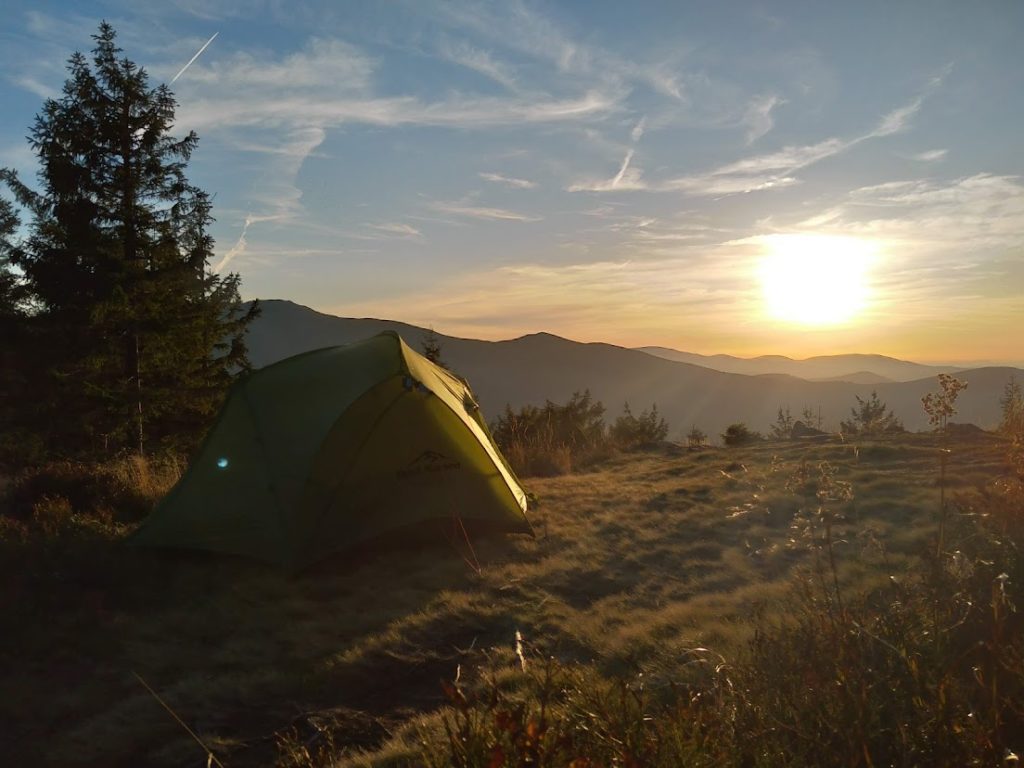
Rules for wild camping in Europe per country
Wild Camping in Albania
Albania’s stunning nature tempts you to set up your tent and embrace the wild landscapes. Albanian law allows wild camping, and you’ll find plenty of space to enjoy a night in the mountains or on a beach.
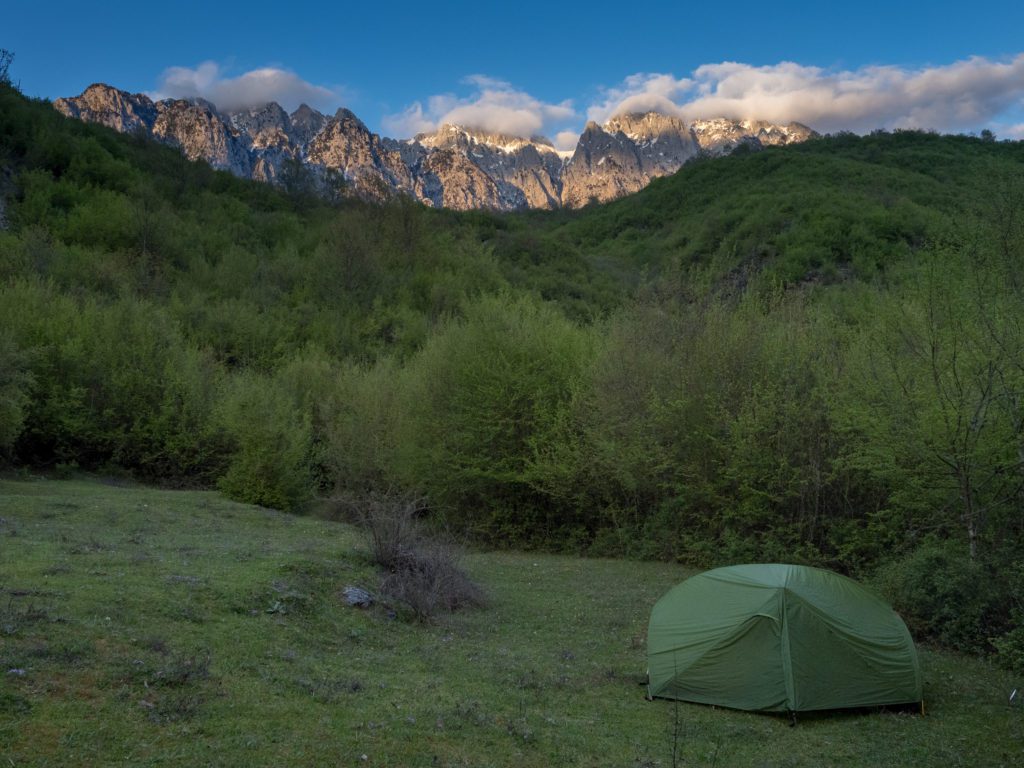
Wild camping in Austria
Wild camping in Austria is generally forbidden, and the fines for breaking the law are high. However, the rules vary from one federal state to another.
Wild camping is entirely forbidden in Burgenland, Lower Austria (Niederösterreich), and Vienna province (in Vienna, it’s not even legal to lay out and use your sleeping bag!).
In Carinthia and Tirol, the law allows for emergency bivouacking. That means you can only set up your tent in high alpine terrain in case of bad weather or injury.
In Upper Austria (Oberösterreich) and Styria, you can pitch your tent in the mountains, above the tree line, provided the land isn’t private or used as pastures or farmland.
Salzburg and Vorarlberg provinces don’t have an outright ban on wild camping, but every mayor can decide on the rules in his municipality. Camping above the tree line is also tolerated, as long as it’s done with great respect for nature and agriculture.
Wild Camping in Belarus
Setting a camp outside of designated areas is illegal in Belarus. It is allowed in certain areas determined by the local authorities.
Wild Camping in Belgium
Wild camping is illegal in Belgium. There is also not a lot of wild nature where you could find a quiet spot to pitch your tent. Definitely don’t try it on the coast!
Instead of wild camping try:
- Bivouac zones are small campsites, usually without facilities (maybe an outside privy on some). They are accessible for non-motorised tourists only and are spread throughout the country in Flanders and Wallonia.
Important info:
– Some camping areas are only open over the summer.
– Sometimes you need to reserve a spot (for free).
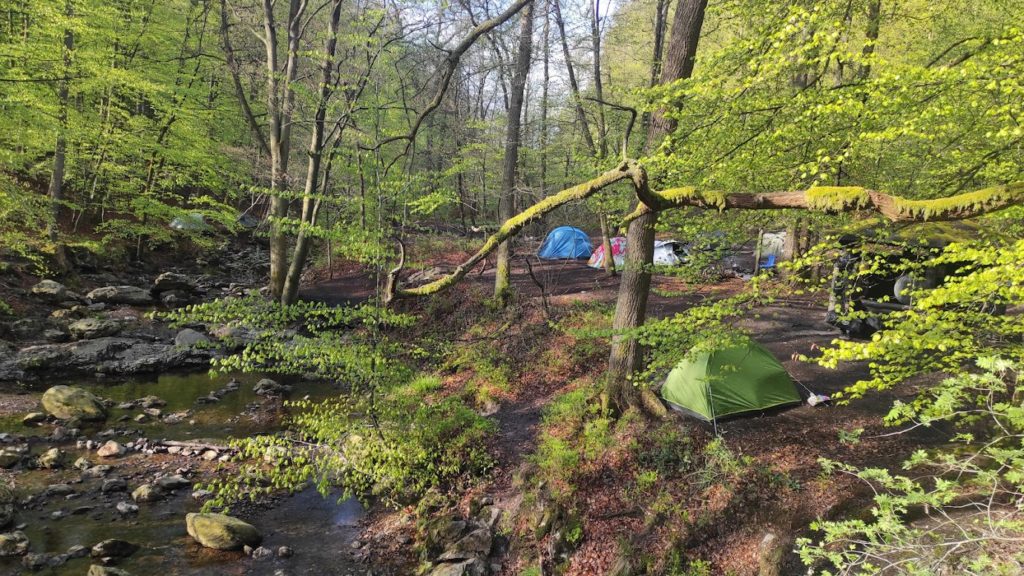
- Welcome To My Garden is a non-profit organisation where the hosts offer tourists a part of their garden to pitch a tent. Thanks to this platform, you can even camp in the centre of Brussels!
Some hosts, especially in the deep countryside, only have profile descriptions in Dutch or French. Don’t hesitate to use Google Translate and contact them anyway! With over 2,3 thousand hosts in Belgium, you should easily find a place to stay and enjoy a truly Belgian experience.
A yearly membership costs 36 euros.
Wild Camping in Bosnia & Herzegovina
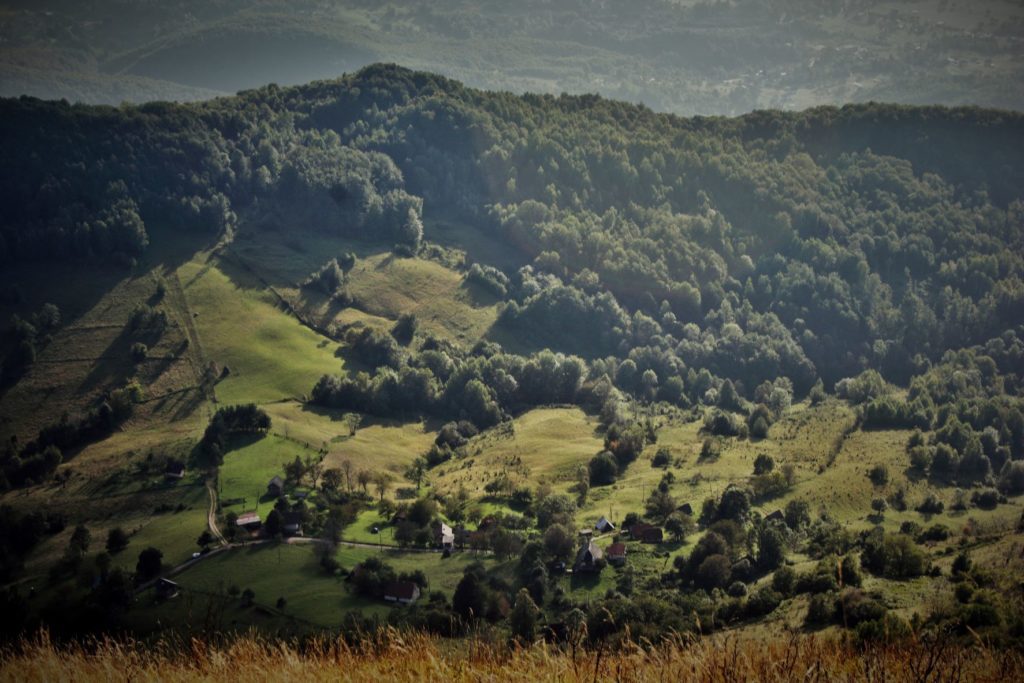
Wild camping is allowed in Bosnia & Herzegovina, but you need to be extra cautious. 29 years after the Bosnian war, mines still contaminate some areas in this country. The authorities set an objective of removing all the landmines by 2030.
You can recognise dangerous areas by red signs with a skull and crossbones. Before setting a camp in the wild, check the area map on the Mines Information Coordination Cell (MICC) website.
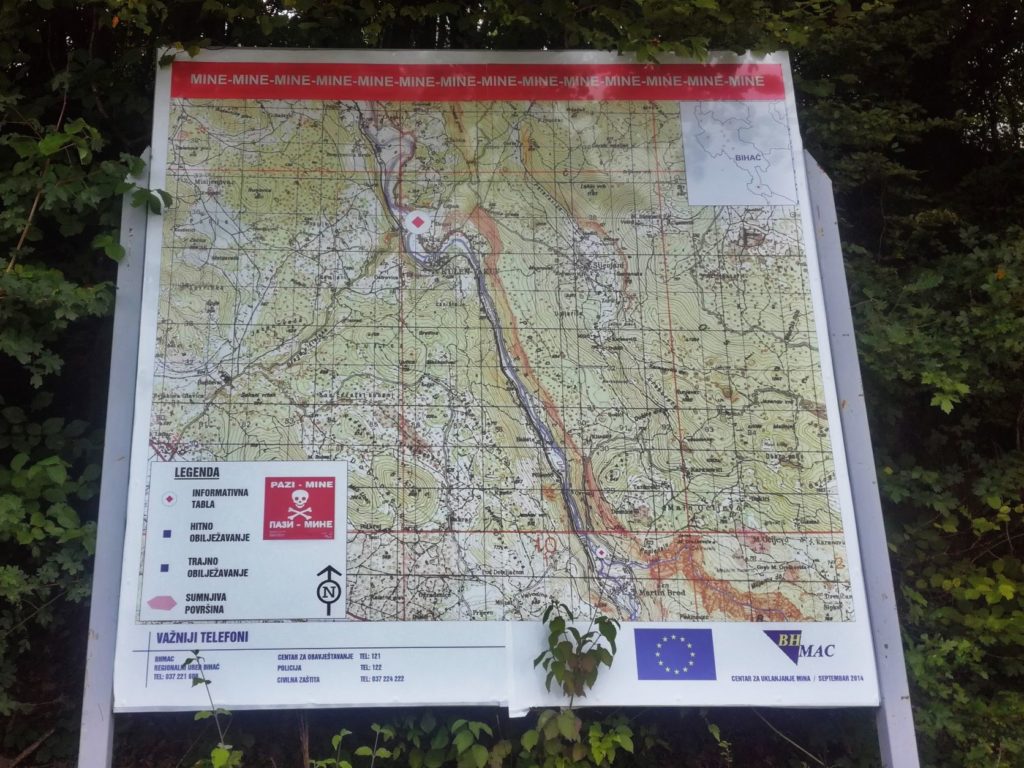
Wild Camping in Bulgaria
Bulgaria has a strong camping culture, and people have always loved spending the summer in a tent on a beach or in the mountains. Recently, however, authorities have been trying to implement restrictions on this activity, primarily because of littering and its impact on nature. The legal situation of wild camping is dynamic, so keep an eye on the developments to avoid a fine.
Currently, you cannot wild camp outside of designated sites:
- in national parks and protected areas
- near natural and cultural landmarks.
There might also be regional restrictions, especially on the Black Sea coast.
It’s also forbidden to light a fire outside of designated places.
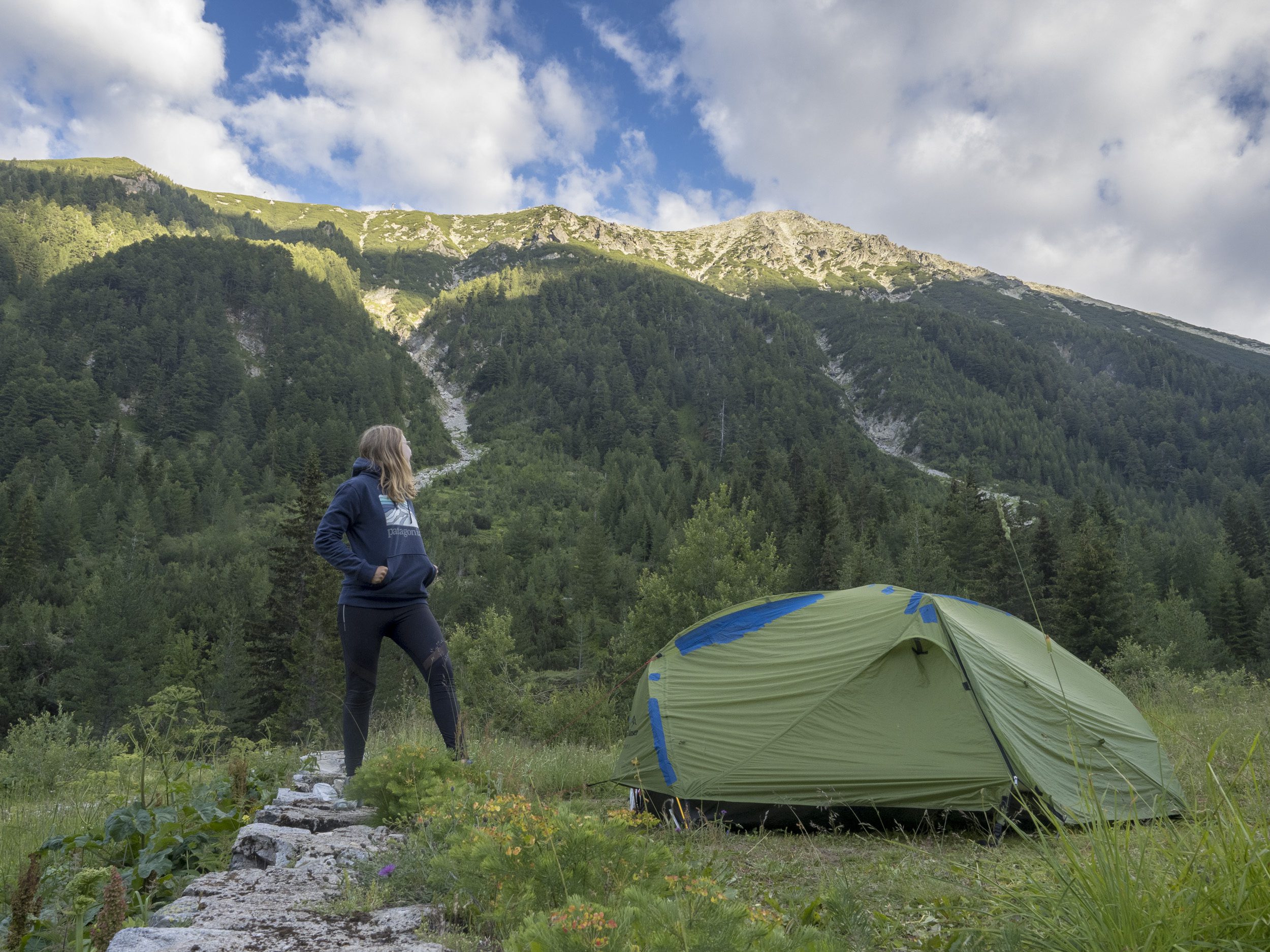
Wild Camping in Croatia
Wild camping is prohibited in Croatia, but in remote places, you can easily find a place to camp without bothering anyone.
On the coast, it won’t be that easy. You risk receiving a fine of up to 400 euros for camping on a beach (most of them have “no camping” signs).
You can try to find a wild beach, but make sure it’s not private. If yes, ask the owner for permission. During a bike trip in 2018, I slept under the open sky by the sea, somewhere between Omis and Makarska. To my surprise, the owner showed up in the morning to prune some trees. I apologised that I didn’t know the land was private, and he was very friendly.
Wild Camping in Czechia
Wild camping is illegal in the Czech Republic. However, you can bivouac (in a bivy sack, on a camping mat or in a hammock) for one night, provided you leave no trace.
National parks, nature protection areas, and private grounds are off the limits, both for camping and bivouacking.
You can also stay a night in wooden shelters called bouda or utulna. A list of these huts is here. You can also find them on this map:
Wild Camping in Denmark
Wild camping is not legal in Denmark.
Workaround:
- There are some open shelters where you can crash for a night. You can find a map with their locations here.
- There are some legal free campsites (sometimes with primitive wooden shelters). You can find them on udinaturen.dk, the official website of the Danish Nature Agency (click Find faciliteter på kort and under udvalgte choose ud at sove i naturen).
Wild Camping in Estonia
Wild camping is legal in Estonia, except for private land, national parks or military areas. If you’re looking for great camping spots and hiking trails, the RMK mobile app is very useful.
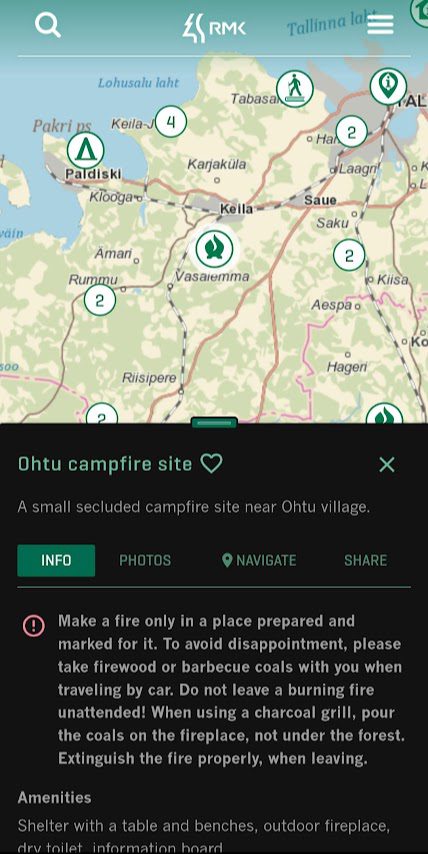
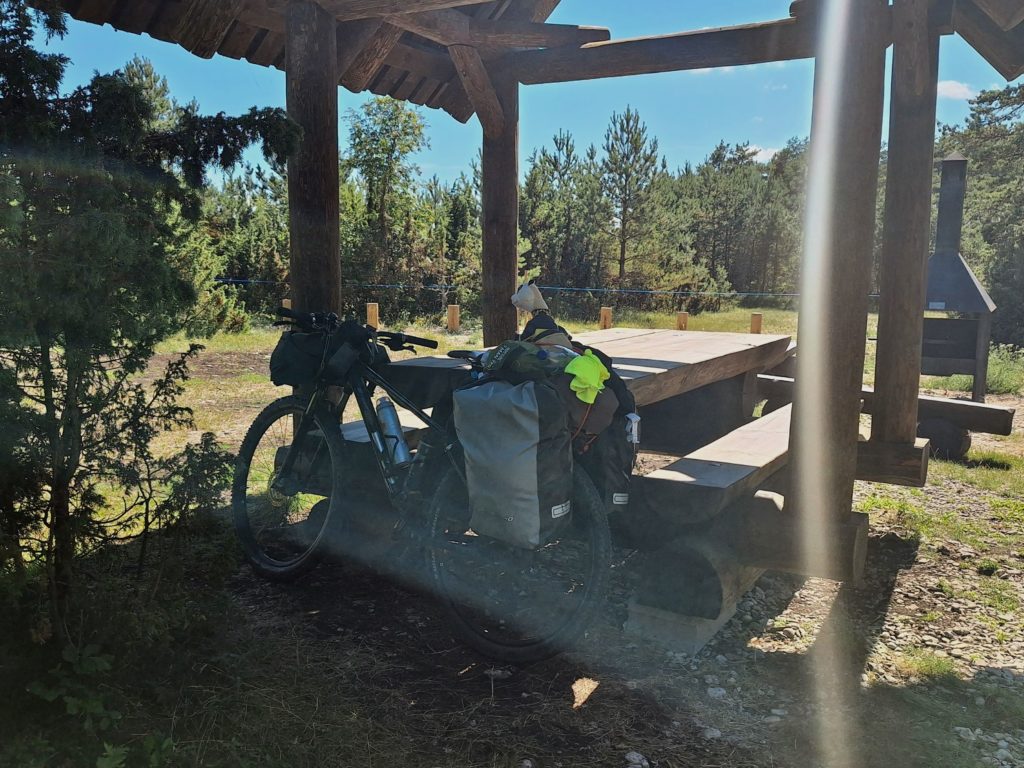
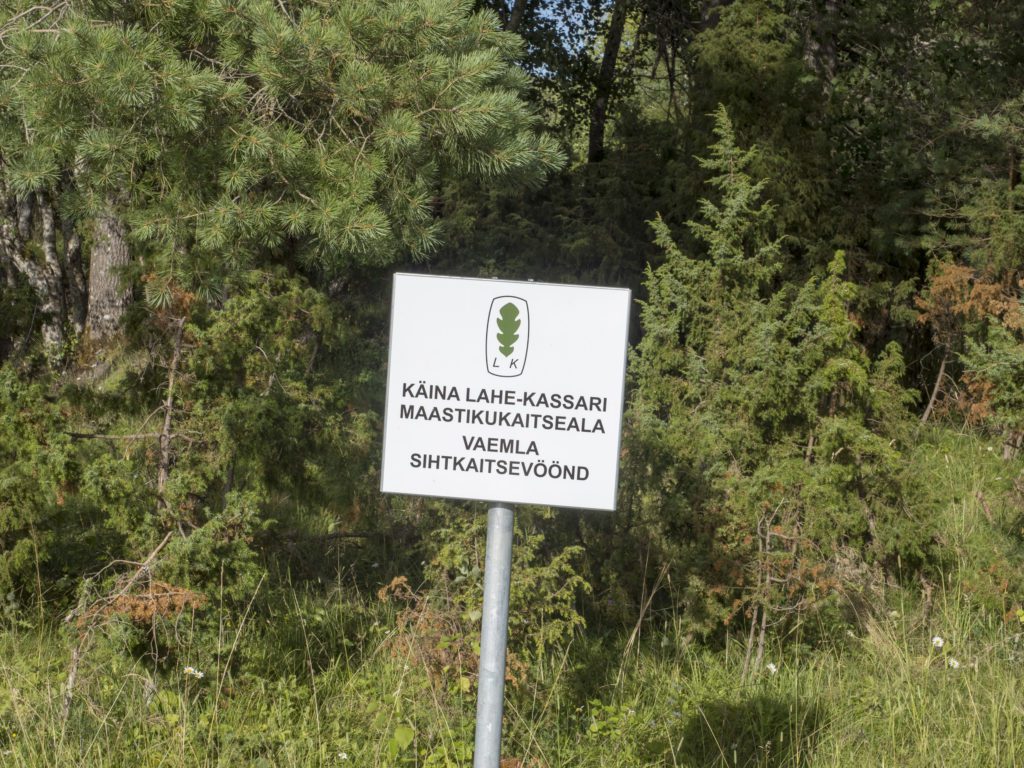
Wild Camping in Finland
Like in other countries on the Scandinavian Peninsula, everybody in Finland has the right to roam. If you maintain some distance from houses and properties, you can camp basically everywhere (for one night).
Finland has an impressive network of open shelters (look on the map here and see how densely they cover the whole country!). You can basically travel across Finland without a tent and find a place to stay every night.
Wild Camping in France
Wild camping is not legal in France. You can, however, also set a camp in some natural areas for one night with a light tent or bivvy after 7 pm and remove it before 9 am. There might be some local restrictions. It’s best to check the laws of the region you are visiting.
For more details, visit this website.
Wild camping in Germany
Wild camping in Germany is illegal, although you’re allowed a one-night emergency bivouac (without setting up a tent).
In some hiking areas in Germany, you’ll, however, find designated places where you can legally stay a night free of charge or for a small fee. Similarly to the Belgian Bivakzones, some of them require a reservation. You can find them in the Eifel region, Schleswig-Holstein, Pfalz and Schwarzwald.
Workaround
- 1nitetent.com is a platform where people let you stay in their garden or land. Usually, you will need to call them beforehand. Most profiles are in German, so you might need Google Translate to communicate. At this point, over 1400 hosts are registered in Germany.
- Schutzhütten – wooden shelters for wanderers located in the mountain areas for emergencies. Most of them are super basic. They are just enough for a one-night stay. Find a map here.
Wild Camping in Greece
Wild camping in Greece is illegal, but widely accepted. Don’t do it on the beaches and in touristy areas, though. Nobody will mind if you pitch your tent somewhere remote in the mountains.
Wild Camping in Hungary
Wild camping for less than 24 hours is allowed in Hungary, except for nature reserves. Nevertheless, finding a good spot that isn’t private property or a protected area can sometimes be difficult.
Wild Camping in Iceland
Wild camping in Iceland is generally not permitted. You can stay one night in your tent on uncultivated land, provided there is no campsite in the immediate vicinity, and the land owner has not restricted or prohibited access, passage or stay within the area by means of signs on gates and walking paths.
There are also specific restrictions in protected areas. You can find more information on the official website of the Icelandic Environmental Agency.
Wild Camping in Ireland
Wild camping per se is not prohibited in Ireland. You need to be aware, though, that most of the land is privately owned and setting up your tent there requires the owner’s permission.
Wild camping code
- Camp at least 500m from a road capable of carrying a vehicle and at least 500m from a building.
- Ensure your campsite is visually unobtrusive and leave it as you found it – or better.
- Move your tent after every second night so vegetation can recover.
- Take away your food waste and litter (even if it’s biodegradable). Animals and erosion can expose buried waste.
- Keep your soap and toothpaste at least 50 metres away from watercourses.
- When you wash dishes, do so 50 metres from water bodies, and strain and scatter your wastewater (never pour it into lakes, streams or rivers).
- Conduct yourselves in a manner that won’t disturb the local community, wildlife or other visitors.
Special rules apply for wild camping in Irish national parks:
- Wicklow Mountains National Park, allows camping without lighting a fire. Camping is not permitted in Glendalough.
- In Wild Nephin National Park, you can camp only in designated spots after prior registration. Camping is prohibited during Condition Orange/Red Fire Risk Danger Notices. Check out the official website for more information.
- Camping is not permitted in Burren National Park and Killarney National Park.
- Camping is permitted in Glenveagh National Park except in the Exclusion Zone. It’s not allowed to light a fire.
- Wild camping is permitted in Connemara National Park (but only for unmotorised travellers. Car camping isn’t allowed). Lighting a fire is forbidden.
Wild Camping in Italy
In Italy, there are no uniform rules on wild camping. Each region has its own law.
Legally, there is also a clear distinction between wild camping and bivouacking. Bivouacking is considered staying in a tent (or without it) from dusk to dawn; wild or free camping is longer. A night bivouac is almost always legally allowed, while free camping is generally forbidden in Italy.
Regarding car camping, there are designated areas where you can spend a night in your campervan or car. You can find their locations here.
Free camping rules in different regions of Italy
You can only camp in designated places in Abruzzo, Liguria, Puglia and Sicily.
In Basilicata and Marche, free camping is allowed only with a written permit from the local authorities.
In Calabria, Campania and Lombardy, each municipality has its own rules for wild camping.
Emilia Romagna, Friuli Venezia Giulia, Sardinia, and Veneto generally prohibit wild camping
In Lazio, the mayor can allow groups or individuals to wild camp for up to 15 days if the place meets safety, hygiene and environmental protection requirements.
The local laws in Melise state that camping is allowed for up to 60 days in areas meeting health, hygiene and nature protection requirements. To be safe, you should contact the municipality for authorisation.
In Piedmont, thanks to the Decree on Wild Camping, you can stay in a tent or a camping vehicle for up to 48 hours only if no official campsites are nearby. You need to contact the mayor of the municipality 24 hours ahead for authorisation.
In Trentino Alto Adige, wild camping and bivouacking are strictly prohibited in natural parks and reserves. The law allows a bivouac for up to 24 hours outside of these.
In Umbria, free camping is allowed in some national parks, but the rules vary from place to place.
In Valle d’Aosta, you can only stay in a tent from sunset to sunrise above 2500 metres.
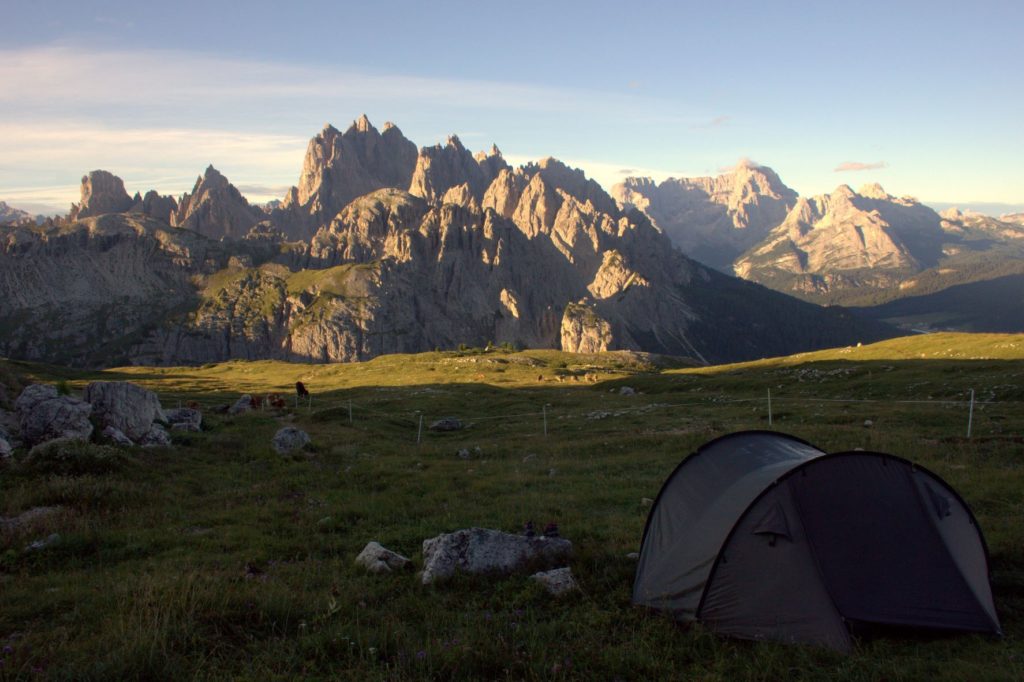
Wild Camping in Kosovo
The legal status of wild camping in Kosovo is unclear. There are no laws prohibiting it, and free camping is widely tolerated.
Wild Camping in Latvia
The Forest Law in Latvia states that everybody has the right to stay and move freely in the state and municipal forest unless otherwise specified in the laws and regulations. That means wild camping in Latvia is mostly legal, except for private property and nature protection areas (marked with signs with an oak leaf).
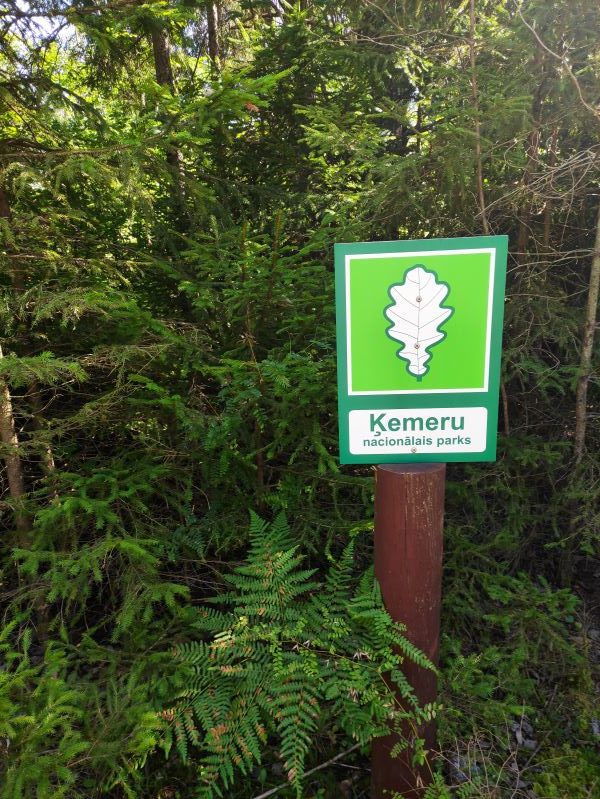
(Photo: CC BY-SA 4.0 Fry72, Karel Frydrýšek)
Wild Camping in Lichtenstein
Free camping in Lichtenstein is illegal.
Wild Camping in Lithuania
Like the other Baltic Countries, Lithuania also allows wild camping. However, it is prohibited in nature reserves, urban areas, beaches, and private property.
Wild camping in Luxembourg
Wild camping is not allowed in Luxembourg. The country is so densely populated that it has no space.
Wild Camping in Malta
Wild camping in Malta is officially not allowed. There is, however, an official free campsite on the island of Comino and in L-Ahrax in the north of the island. You must apply for a permit to camp in L-Ahrax at the local council.
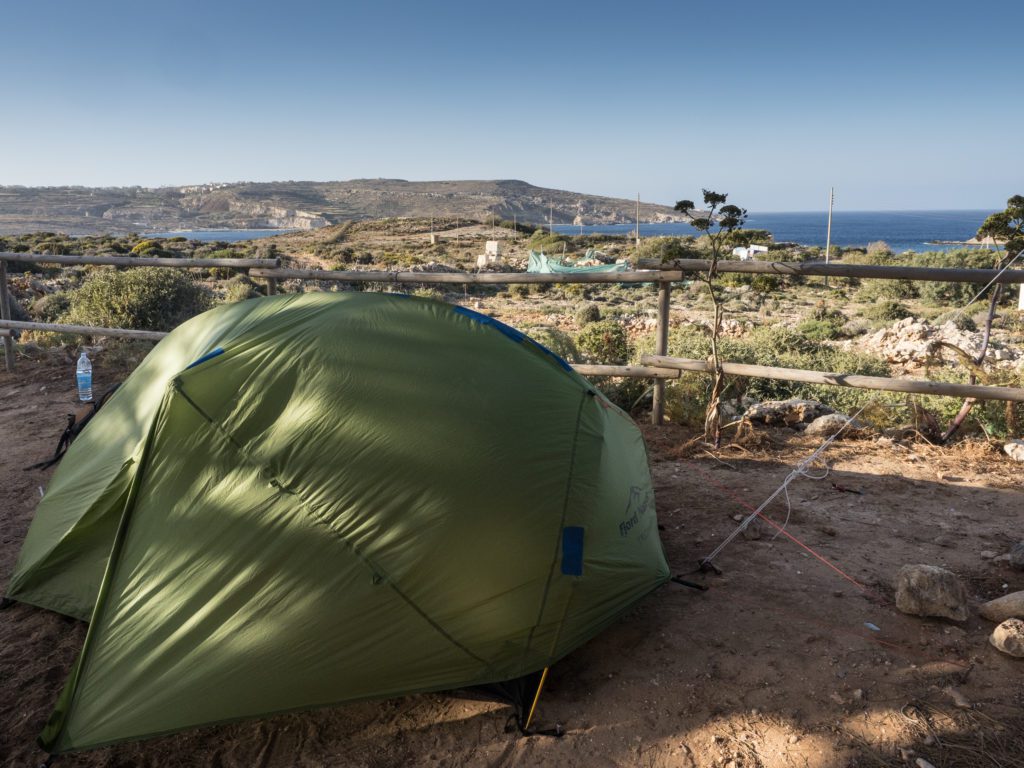
Wild Camping in Moldova
Free camping in Moldova is legal.
Wild Camping in Montenegro
The situation in Montenegro is similar to Croatia: wild camping is officially not allowed, but if you pitch your tent in remote regions and are discreet, no one will mind. Don’t do it on beaches or in touristy areas and respect private property.
Wild camping in the Netherlands
Wild camping in the Netherlands is illegal, and you might face a high fine. Finding a quiet spot in this densely populated country is nearly impossible.
Until 2020, there was a way to camp for free legally—Paalkamperen, simple campsites with basic amenities. Unfortunately, the State Forest Management has closed them due to campers leaving trash and not respecting nature.
Workaround
- Welcome to my garden – this Belgian project has some members in the Netherlands. The idea is that people let you pitch your tent in their garden for one night for free. Only hikers and cyclists can use it. You need to contact the host beforehand.
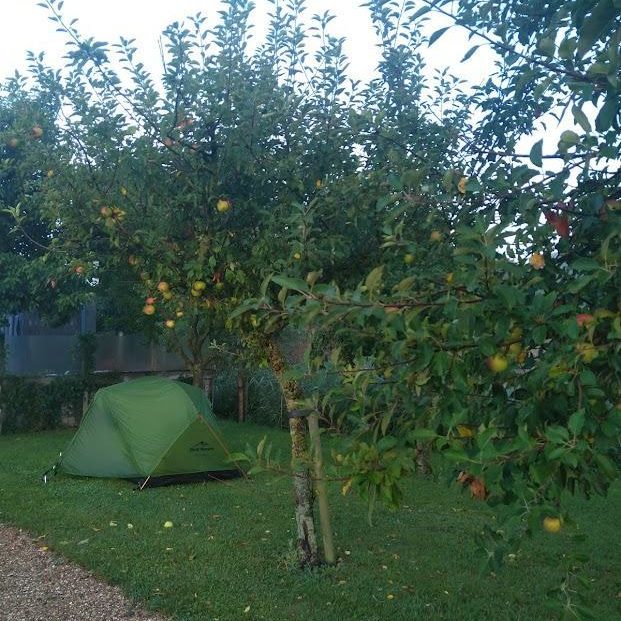
Wild Camping in North Macedonia
Theoretically, wild camping is not legal in North Macedonia. In practice, it is widely accepted by the locals and authorities. I camped there without any problems.
Wild Camping in Norway
Norway is one of the few countries in Europe where wild camping is legal. You can pitch your tent nearly everywhere thanks to allemannsretten (everyman’s right). There are two basic rules you need to follow:
1. Stay 150 meters from the nearest house or other buildings and not on cultivated farmland.
2. You cannot camp in one spot for more than two nights. Respect nature and wildlife, take your trash with you and be quiet.
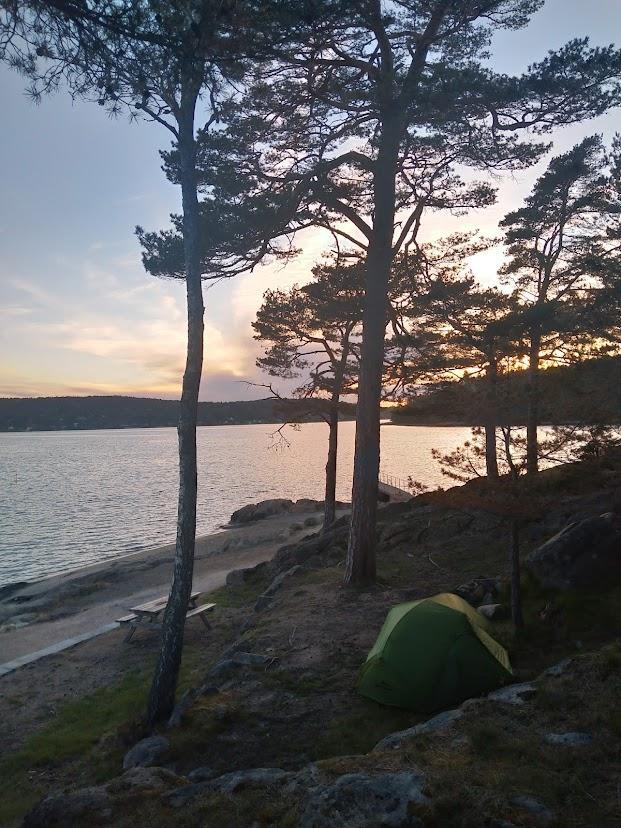
From 15 April to 15 September, open fire in the wild is banned, so forget about the campfires in the summer! A total ban on camping stoves is possible during droughts (you can check yr.no for warnings).
In the Norwegian mountains, there are also a lot of open shelters (gapahuk). Some of them have a supply of firewood and food (sometimes, you will find a bank account where you can send money if you take wood or food). You can access the map with the shelters here.
Wild Camping in Poland
Wild camping is not officially forbidden in Poland. It is also widely tolerated. However, you need to ensure you’re not on private property.
In the state-owned forests, you can only pitch your tent in designated areas. A map of these areas is here.
In the mountains, you can also find some provisional wooden shelters. To find them, visit this website (including some shelters in other European countries).
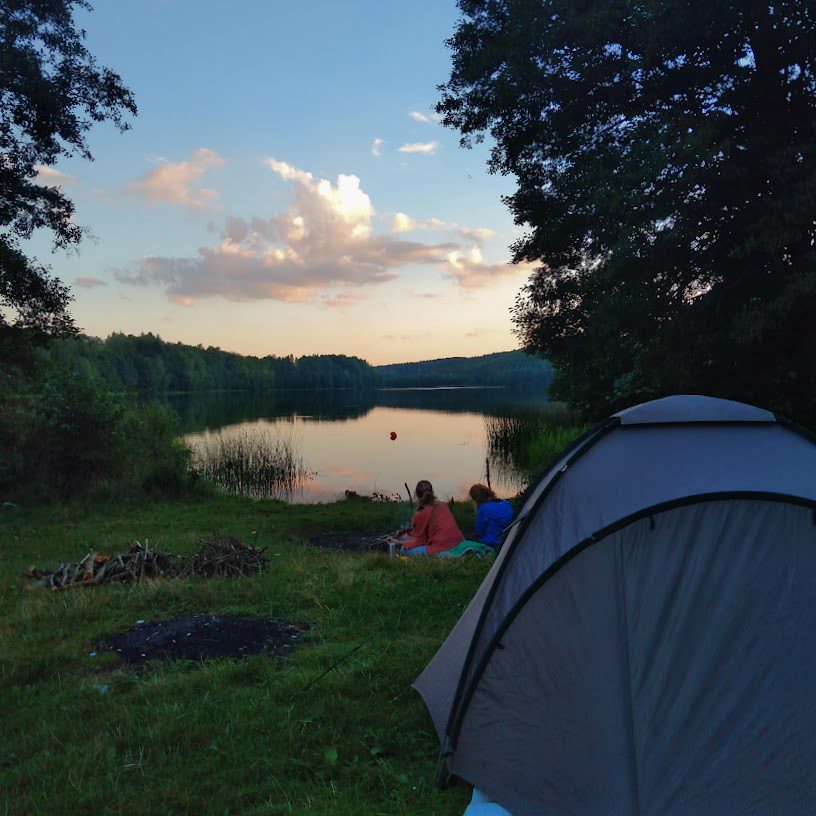
It is illegal to wild camp in national parks and nature reserves. You shouldn’t also camp at beaches by the Baltic Sea.
Wild Camping in Portugal
Since 2021, wild camping has been legal in Portugal, but it is still not allowed on the coast, in Nature 2000 zones and protected areas.
Wild Camping in Romania
Wild camping in Romania is widely accepted and popular. Most landowners will also agree if you ask them permission to pitch a tent on their land. Some local restrictions may apply, especially in the nature reserves.
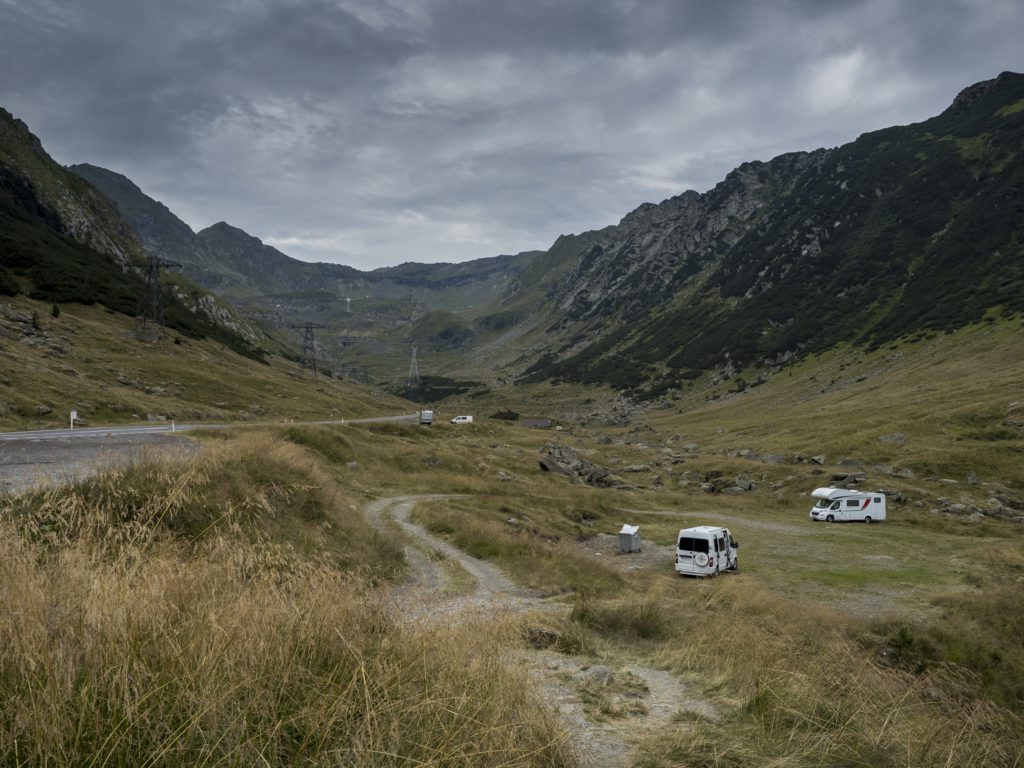
Wild Camping in Serbia
Wild camping in Serbia is allowed. Exception: national parks and protected areas.
Wild Camping in Slovakia
Wild camping is officially not allowed in Slovakia. It is, however, tolerated in most of the country. You shouldn’t set up a tent in national parks, forests, and protected areas unless there is a designated bivouac place.
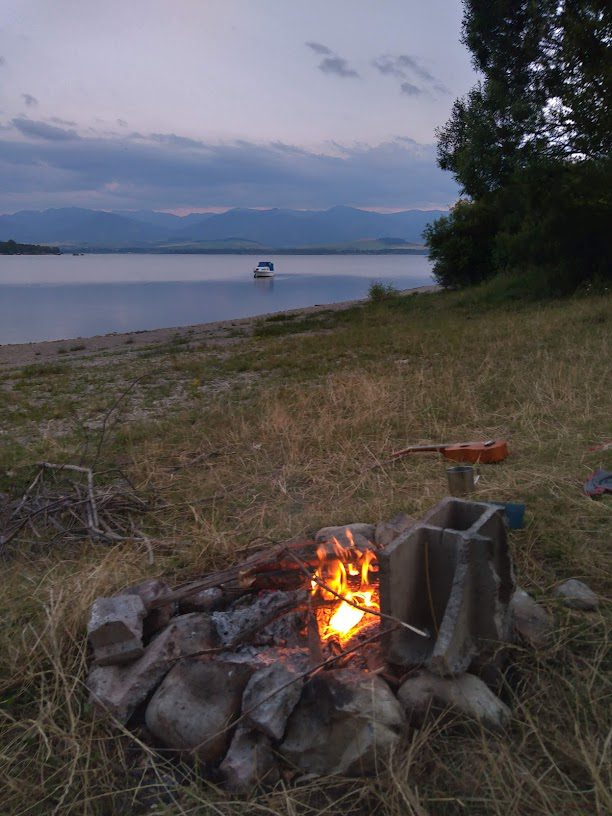
Wild Camping in Slovenia
Wild camping is illegal in Slovenia. Definitely don’t do it in Triglav National Park, where a fine for wild camping can be up to 1000 euros!
Wild Camping in Spain
The legal status of wild camping in Spain is complicated. It is strictly prohibited on the coast and in national parks, and it is an absolute no-go in Andalucia, Valencia, Navarra, Galicia, Extremadura, and Asturias.
When it comes to national parks, camping is allowed at the following altitudes: 2500 m in the Ordesa region, 2550 m in Pineta (above Balcón de Pineta), 1800 m in Escuaín (La Ralla), and 1650 m in Añisclo (Fuenblanca). Overnight stays in the same region may not exceed three nights, and tents and other materials used may only be pitched between 1 hour before sunset and 1 hour after sunrise.
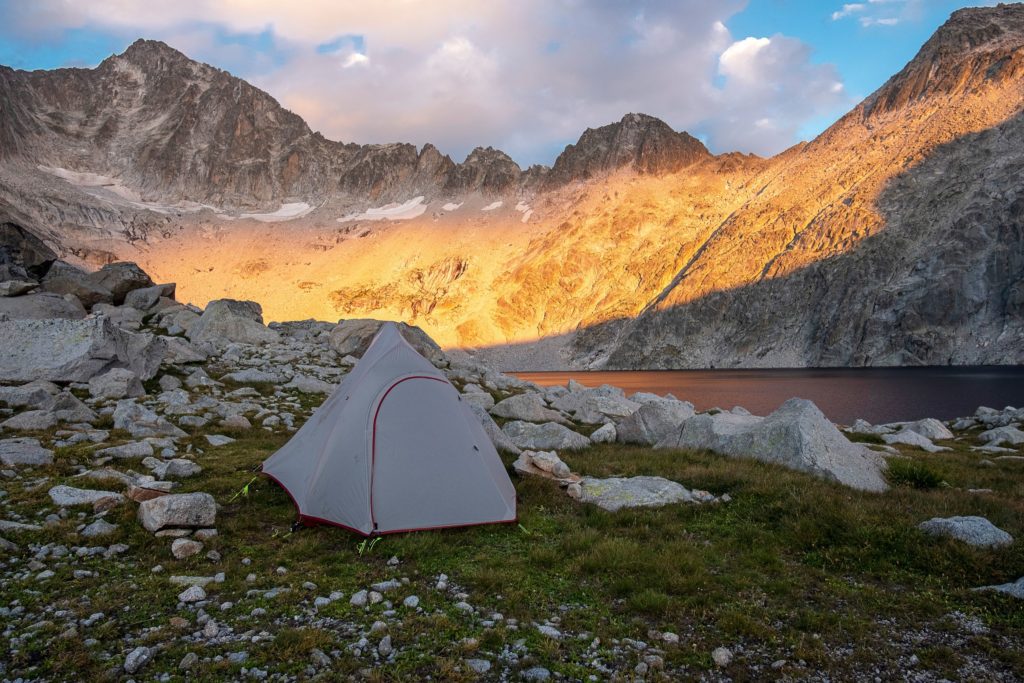
Wild Camping in Sweden
Like in Norway, Swedish law guarantees you the freedom to roam, and you can legally wild camp for one night nearly everywhere, as long as you keep enough distance from houses and private property.
There are also free shelters and basic huts in many wild areas where you can stay a night. Check out the map on this website.
Wild Camping in Switzerland
Wild camping in Switzerland is more or less illegal, and like everything in this country, the fines are atrociously high! However, you can camp in the mountains above the tree line for one night (don’t do it in national parks and protected areas!). Some cantons are more liberal, others more restrictive, so before setting up a camp, check the laws of the region you visit.
Wild Camping in the United Kingdom
Wild camping is prohibited in England and Wales. It is, however, tolerated in unpopulated mountain areas. In Dartmoor National Park, there are areas where it is legal. Check out the map here.
In Scotland, free camping is allowed.
In remote areas in Scotland and Wales, you can also use bothies – shelters without facilities like water, beds and electricity, where you can stay free of charge. You can find a map of bothies here
Awesome information. Thank you
Amazing information Joanna
Thank you so much
Pingback: Cycling in Sicily - practical bike touring guide - Wobbly Ride
Pingback: Cycling Albania - practical bike touring guide - Wobbly Ride
Pingback: The Best Cycling Routes in Poland - Wobbly Ride
Pingback: Accommodation on a Bicycle Tour - Resources and Tips
Pingback: Inspiration til cykelture rundt i Europa – Med tog fra Danmark til udlandet